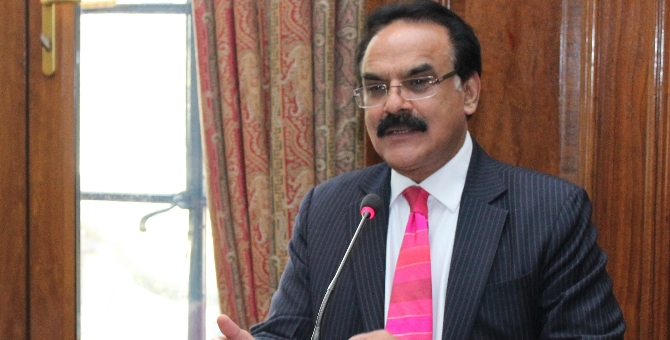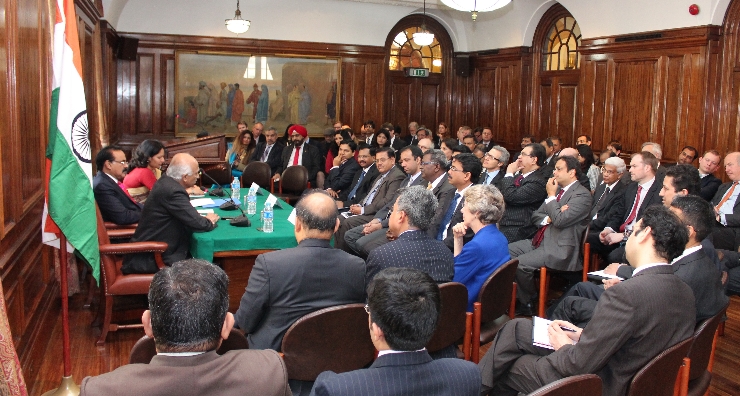Driving commercial and political engagement between Asia, the Middle East and Europe
Driving commercial and political engagement between Asia, the Middle East and Europe
Driving commercial and political engagement between Asia, the Middle East and Europe

India was wrong to impose retrospective taxation on certain international transactions – a matter that has led to Vodafone and Shell fighting tax bills of billions of dollars in the Indian courts.
Dr Arvind Mayaram, Secretary, Department of Economic Affairs, Ministry of Finance, Government of India, made the comments at an interactive session at the High Commission of India in London shortly before the world’s largest democracy began voting. Approximately 814 million people will vote in India’s general election, the largest election in the world. The election started today, 7 April and takes place in nine phases, over a period of six weeks and continues until 12 May.
Dr Mayaram said most countries, including developed countries, were facing a problem of “base erosion profit shifting” in their taxes, often due to “smart accounting” by MNCs which had multiple bases.
“The OECD has an entire project dedicated to base erosion and profit shifting. There is an issue now of where profits should be taxed,” Mayaram said.
In 2012 the Indian Government introduced a new law stating that foreign firms would be obliged to pay taxes on any overseas transaction involving an Indian asset dating back 50 years.
“Any change in the law that is retrospective in nature is not a good policy,” Mayaram said.
“India, the UK and other countries have done it but that does not mean it is good. It is bad in principle as it does not give a kind of certainty,” he told the audience which included representatives from Shell, Vodafone, the Foreign and Commonwealth Office, Reserve Bank of India and UK Trade & Investment.
“Now we have brought out a grandfathering clause and we will have a direct tax code to simplify things with less exemptions,” he said.
Mayaram said that India would continue on the same course of opening up her economy that she had been on since liberalisation in 1991, regardless of which party won the general election. The results will be announced on 16 May.
He pointed out India had been on a linear course following the same policies since 1991 despite having witnessed “governments of all shapes and sizes including ones that lasted 13 days and ones that lasted five years or more.”
“If we assess the economic policies of the various governments of India there has been not much of a deviation from a path of ‘opening up with no disruption’. That will continue whatever government comes into power in May. There won’t be a change of direction. If we look at West Bengal which was governed by the Communist Party of India for 20 years during this same period, foreign investors still invested heavily in it and there was still a huge opening up during that period. It’s inherent in the genes of Indian democracy that whatever party is in power, that there is moderation. India is a huge country which needs consensus and compromise,” he added.
Mayaram was in the UK together with representatives from infrastructure debt funds and business trusts. The Indian Government is currently looking for foreign investors in a range of stalled private infrastructure projects in India. Mayaram explained that the reason many huge infrastructure projects were languishing was not solely connected to the slowness of getting Government and environmental clearances, but also because private companies had ran out of money – having been too ambitious in what they could afford during India’s high growth period.
The Indian Government was now renegotiating contracts and considering financial restructuring of the stalled projects through infrastructure debt funds. Those investing in these funds would receive tax breaks and they would suit long-term investments such as those made by pension funds, sovereign wealth funds and foreign institutional investors.
“Because it’s a debt instrument it’s an assured return. If we have 150m people coming out of poverty in India in the next five years then we need roads, telecoms and water supplies. Returns will be very robust over the next 15-20 years,” he said.
A Cabinet Committee on Investment had also been set up to speed up project clearances. From January 2013 to January 2014 the committee had given final clearance to 303 projects with an estimated $116bn estimated outlay, he added.
“This fiscal year we will see a $75bn capital investment by the public sector and so you will see a gradual unbottling of projects that have been held up – it’s already happening and we are looking at business trust models for real estate and infrastructure projects so that pooling of investments can take place.”
He said huge investments were being made in the power market and tariffs were being increased to bring consumer prices closer to market prices. The Indian Government was also looking at expanding production of solar power since India was the cheapest in the world to produce solar power.
Mayaram, who is also a director on the Board of the Reserve Bank of India, spoke extensively about the problems that have battered the Indian economy in the past few years despite India experiencing an average growth of more than 8.5 per cent between 2003/4 and 2009/10.
“There was a time when we believed this was not going to change,” Mayaram said. “All the ingredients for long-term growth were there but there was very little understanding globally of how sudden destabilisation in the global economy could turn that development on its head,” he said referring to the 2008 collapse of Lehman Brothers.

Various business people and UK government officials attended the interactive session with Dr Arvind Mayaram at the High Commission of India in London. Dr Mayaram is seated with the High Commissioner of India to the UK HE Mr Ranjan Mathai and Rachita Bhandari, First Secretary (Economic) High Commission of India in London
Mayaram said India’s fiscal deficit had dropped from 5.9 per cent of GDP in 2008-2009 to 4.9 per cent in 2012-2013, but was still much higher than the 2.6 per cent in 2007-8. Yet he remained optimistic.
“The current fiscal deficit is 4.6 per cent and is predicted to be 4.1 per cent next year and 2.5-3.6 per cent in the following years,” he added.
He said soon after he took up this position in 2012, he received notice that credit rating agencies were threatening to downgrade India from BBB- (investment grade status) to junk status which would have led to US$100 billion going out of the country immediately. “The Government of India faced this with determination and never defaulted in our external obligations,” he added.
There were fears the “Government would default and there would be a run on the dollar in India. Those fears alone led to 11.8 US$ million being taken out of India between May and June last year,” he said.
“The question we had was should we use capital controls as the rupee was slipping and was expected to hit Rs. 70 to one US dollar by last November We decided that that would create panic so we decided to compress gold imports instead. People kept saying there was a political paralysis and we couldn’t reach decisions but this was counter-factual.”
As a result of cutting gold imports, the current account deficit has dropped from $88 billion in 2012-2013 to an expected $35 billion in 2013-14, he said.
He said inflation in India was now 4.68 per cent and he put recent years of high inflation down to an increase in consumption of poultry, eggs, milk and fruit. “Consumption of these has increased exponentially per capita” he said, giving as an example consumption of eggs which he said was four eggs per capita in 1993/4 and was now 15 eggs per capita.
“We are in a major transition in India in terms of people moving from to a better living class which we may call middle class. Incidences of poverty have come down 20 per cent in the last 10 years. Between 2003/4 and 2011/13 150 million people have come out of poverty. But a further 250 million people still need to come out of poverty,” he said. “So the transition is happening but we don’t see it so we still think of India as poor. The total numbers are so large you don’t see a dramatic change but it is happening and that is also creating a new market for new investments to happen in India and for businesses to find markets in India.”
Foreign direct investment (FDI) is now on the increase into India too, he said. “We have received more than $2bn net higher FDI inflows this fiscal year than we received last fiscal year. The confidence level of foreign investors has not gone down,” he told the audience.
India is now on a drive to increase manufacturing, which has dropped in recent years as currently 56 per cent of India’s GDP is in the services sector. “Manufacturing has gone down and we want to build it back to 25 per cent in the next five to seven years. For that a large number of measures are being taken, including the creation of $90 bn Delhi Mumbai Industrial corridor, which will include a dedicated freight railway. Regional integrated manufacturing zones will be created and we will have more public private partnerships (PPP) than the 1,000 PPPs we have already,” he said.
“We are also looking at special industrial townships to help word-class industries to come.”
The Government was also working on the structural reform of the agriculture side to create better supply chains and manage the food supply better, he said.
He said the Government was focusing on macro-level infrastructure such as railways and roads and other investment was expected to flow in as a result.
He also defended the National Food Security Act, 2013, which aims to provide subsidized food grains to about two thirds of India’s 1.2 billion people.
“Today not a single person dies of hunger in India. In a civilised country we need to do this. In the 1940s Bengal famine two million died,” he said, adding it was just an extra $ 4-5 billion on what the Government already spent on food subsidies.
According to Mayaram, corruption in India has not increased but the media and the Right To Information (RTI) Act has increased coverage of it. “It’s the strength of our country that we can speak about it and prosecute,” he stated.
Regarding the 2G scam in which 120 telecom licences were handed out at well below market rates to a select group of firms in 2012 losing the exchequer nearly $40bn, Dr Mayaram said it had benefited people in India as they could get mobile phone packages really cheaply meaning lives of even poorest has been transformed.
“It was a good policy not to auction these licenses as we now have more telephone connections than toilets. If we had auctioned them, who would have paid the extra costs? The consumer. Is the government meant to make money like a businessman? Policy making is complex ,” he said adding benefits to a large number of people in a country also had to be taken into account.
naomi.canton@asiahouse.co.uk
This is the first in a a series of stories that Asia House will be carrying on the Indian General Election 2014. All the stories can be viewed here.
